For anyone wishing to travel to Chile, this country has so much to offer you. If you’re an adventure enthusiast and love nature, southern Chile is the place for you to go. If you’d rather explore vineyards, the central region is a perfect fit. This post is meant to be a general overview of Chile so you can get to understand its geography, history, culture, ways to get around, and much more. I was there for nine months, where I spent most of my time in a small village called Sagrada Familia that’s situated around three hours south of Santiago.
Geography
Chile is a long, thin country in the south western part of South America. It houses the Atacama Desert in the north, rolling hills and vineyards in the central area, and Patagonia in the south. The Andes Mountains run down eastern Chile.
Chile is part of the Pacific Ring of Fire and is home to around 500 volcanoes. If you stay there long enough, you’re bound to feel some tremors.
Climate
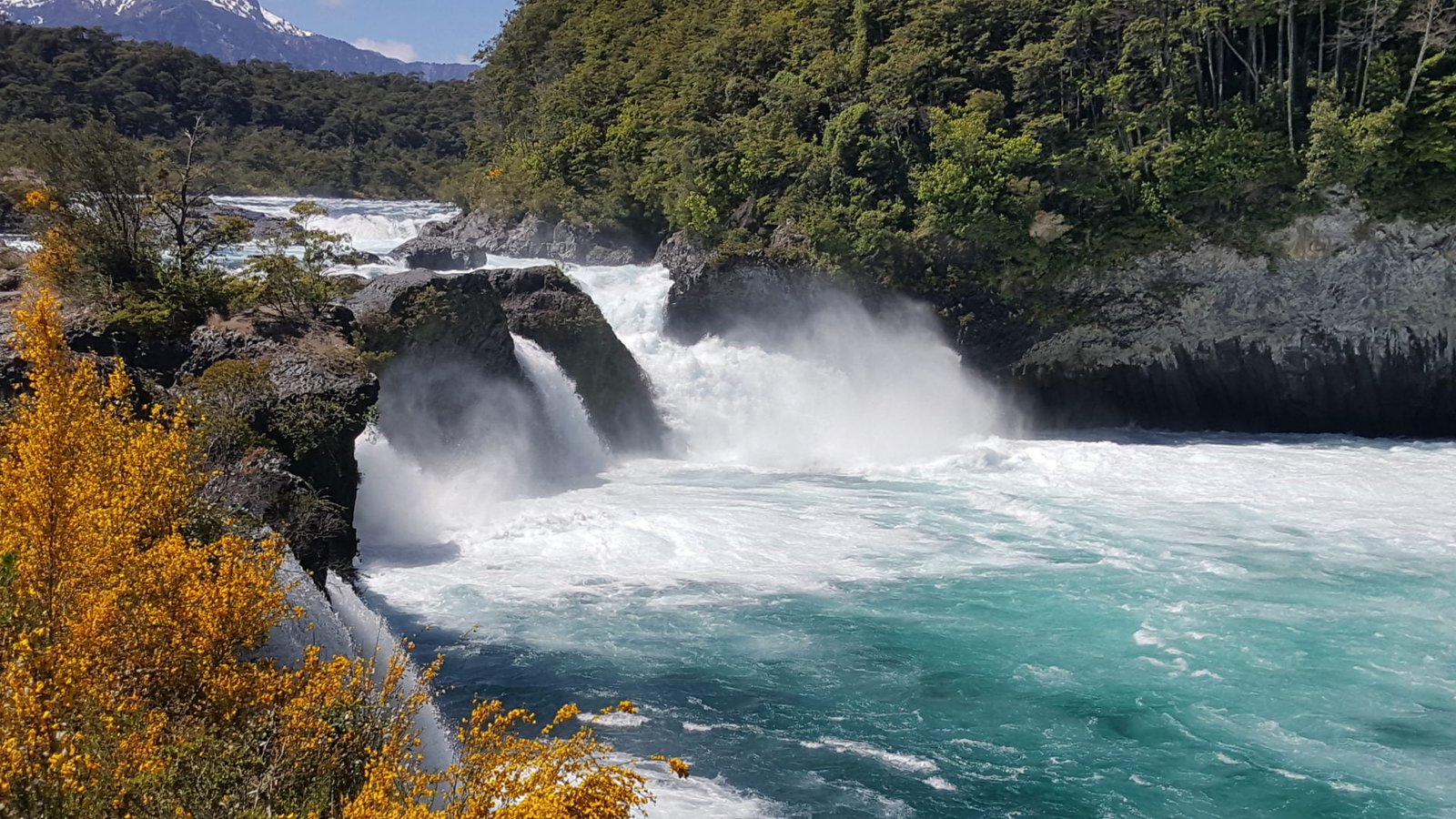
Scenery in Puerto Varas, Chile
The climate varies dramatically: the north is hot and dry, although cool at night. The central region has a hot summer and a long growing season, with a rainy winter where temperatures rarely drop below freezing. Don’t be fooled, though: most houses only have small wood stoves or electric heaters in the living room, so rooms and buildings are quite chilly.
The south is cold and windy and is quite bleak during winter. Winter brings lots of rain and snow in some areas. The furthest south region in Chile, the Magallanes Region, is the only area in Chile where central heating is installed.
The summer months of December to March are best when visiting the south, but if you’re able to go to Chile during September you’ll be able to take part in the Fiestas Patrias, Independence Day, celebrations – and boy do they celebrate!
Government
Chile is a democratic republic. The president is the head of state and the head of government, and cannot serve two consecutive terms, but can run again after. Sebastian Piñera is the current president, who was elected in December of 2017 (while I was there).
Michele Bachelet was the previous president, and more left-leaning. Her popularity suffered when her family was embroiled in a corrupt real estate transaction. In her second term she did, however, sign a bill ending a complete ban on abortion.
History
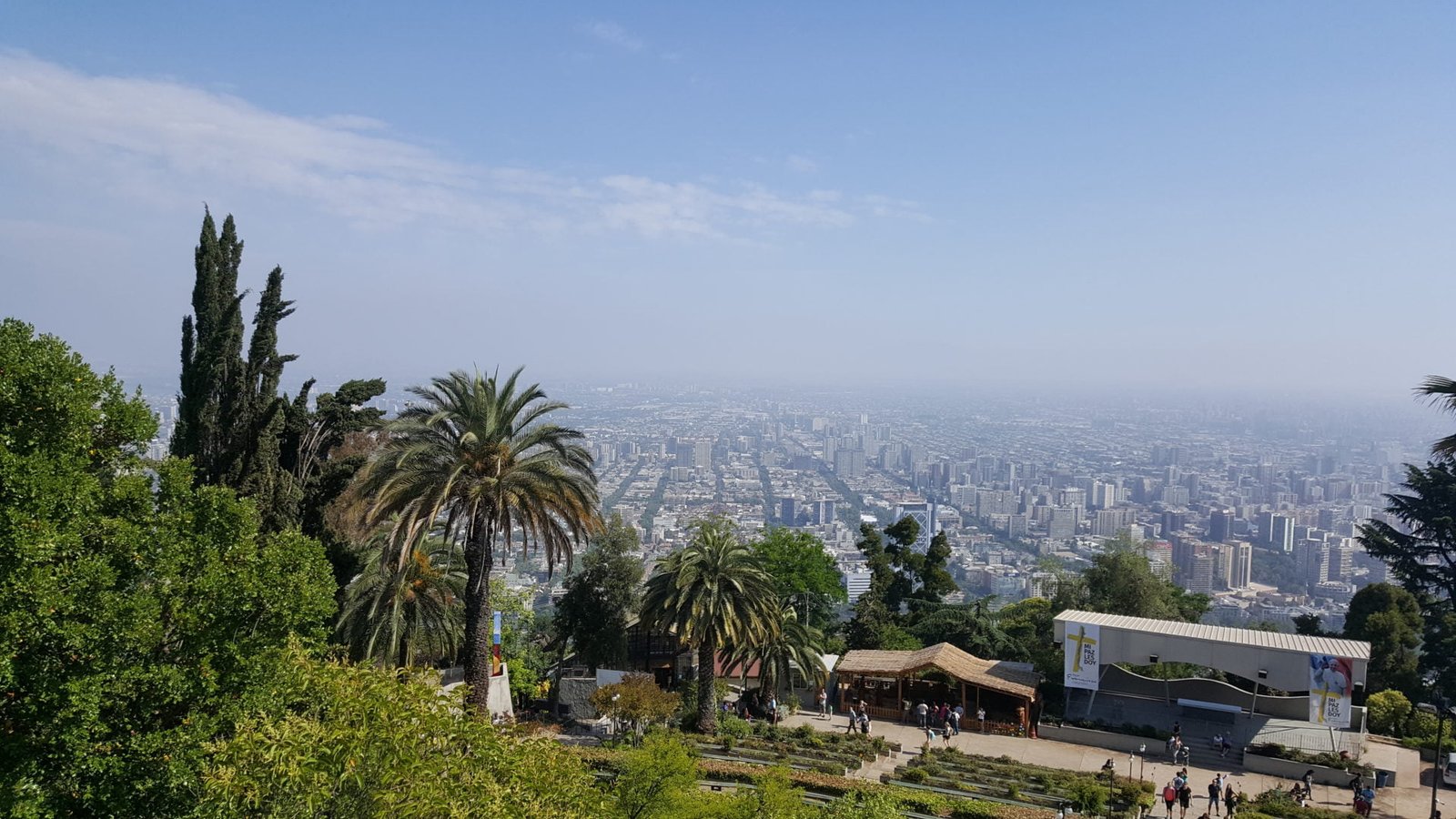
View of Santiago from San Cristobal
Chile doesn’t have a large indigenous population, but the indigenous Mapuche are situated largely in the south around Temuco. They are currently continuing to fight for sovereignty from Chile; in fact, one candidate in the 2017 election, Beátriz Sanchez, ran on sovereinty for the Mapuche and a new constitution for Chile (at the constitution was constructed during Pinochet’s era). For more information on the struggles between the Mapuche and the Spanish, refer to the history section of my post on Valdivia, Chile.
There is also a large Quechua influence in the northern part of Chile; the Incan empire had conquered that area for a period of time.
Pedro de Valdivia from Spain conquered Chile in 1740 and founded Santiago. Chile was under Spanish rule until 1810; on September 18, 1810, Chile formed an administrative junta and declared independence (fiestas patrias is celebrated on 9/18), although independence didn’t actually occur until years later.
The northern part of Chile actually belonged to Bolivia for awhile; Chile took that section from Bolivia in the War of the Pacific, which started in 1879, effectively land-locking Bolivia. In 1904, Chile and Bolivia signed the Treaty of Peace and Friendship, where Bolivia and Chile agreed on a country boundary line, establishing the northern section as Chilean. In return, Bolivia was given commercial transit to Chile’s northern ports.
However, in 2013, Bolivia took Chile to court, arguing that access to the Pacific Ocean would increase their per capita GDP, while barely hurting Chile at all. The U.N.’s International Court of Justice ruled in Chile’s favor.
Perhaps the most well-known part of Chile’s history is the rise of the dictatorship of Pinochet. Augusto Pinochet overthrew the democratically-elected socialist president Salvador Allende in a coup d’etat in 1973. He was head of the military junta, and ruled up until 1990.
The U.S. Department of State Office of the Historian quotes the following in regards to Allende’s presidential run:
The U.S. Government used covert funds in Chile during this election period, not for any one candidate’s use but to prevent Allende’s election. U.S. support had some impact on the election, but Allende still received over one third of the popular vote.
Office of the Historian
The coup is widely regarded as being U.S.-backed. The U.S. Congress also issued a report entitled Covert Action in Chile: 1963-1973, which is a fascinating (albeit depressing) read. Additionally, the U.S. continued to support Pinochet throughout his reign, despite the human rights atrocities that he ordered. The U.S. Department of State website, however, only says that “debate continues” on if the U.S. supported the coup.
Many do credit Pinochet to opening up Chile to the world and creating a more prosperous economy (and implementing a string of neoliberal reforms). Ironically, Pinochet did recognize the importance of keeping copper nationalized; Allende was the one who completed the nationalization of the three major copper mines in Chile, and Pinochet did not privatize them. They are still state-owned to this day.
Facing mounting international criticism, a 1988 referendum asking for Pinochet to rule another 8 years (known as the yes or no referendum) was issued: 56% said no. Elections were held in 1989 and a new president was elected in 1990; Pinochet, however, managed to keep the title of the military’s commander in chief in 1998, when he left the country, went to London, was arrested, then released in 2000 due to medical reasons. He went back to Chile, was placed under house arrest there in 2004 while awaiting trial, and then died in 2006 of a heart attack.
Although Chile is economically quite well-off now, the years of Pinochet are sensitive topics, particularly with the older generation, so keep that in mind when traveling through Chile.
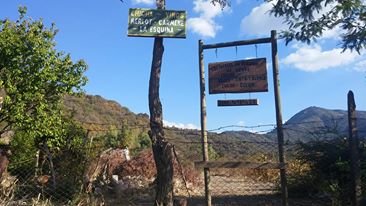
Rural Chile in the Maule Region
Languages
Chileans speak Spanish, although they’ll like to tell you that they speak “Chilean” since their Spanish is a little funky, to say the least.
They tend to remove s’s from words to speed up speaking, and also conjugate the tú form as –ai rather than –as (so, cómo estai? instead of cómo estás?). Rural folk tend to have thicker accents than city folk.
There are certain Mapuche words embedded in their Spanish as well; for example, it’s common to say guagua (pronounced wa-wa) for baby.
In the cities, there are a decent amount of people that know and speak English, and there are also large populations of Haitians, so French Creole is common as well.
Religion
Chile is a Catholic country. They just recently passed their first abortion law in 2017, which legalized abortion for only certain situations: if the mother’s life is in danger, if the fetus will not survive pregnancy, and if the woman was raped.
There’s a smaller population of Evangelicals, whom are deemed the “more religious” according to Chilean Catholics. The Evangelicals where I stayed went around the village singing every Sunday. There was also an even smaller Mormon population of expats.
The Catholicism practiced in Chile is quite relaxed. Birth control was readily available at the high school I worked at. Marriage is becoming less and less common (although the family nucleus is still quite intact), and many families don’t go to church frequently.
Being a Catholic country also means that there are a lot of religious holidays for saints and the like, so if you’re working there you’ll enjoy learning about which saint is being celebrated on which holiday.
Food & Drink
Boy do Chileans love to eat and drink! They’ll also love introducing you to new alcoholic drinks to try, and wait with an expectant face to see what you think.
Drink
Local red wines are popular; wine is very cheap, so indulge in buying a nice bottle of merlot or cabernet sauvignon for less than $15. Gato is one of the cheapest options out there; even cheaper wines are usually boxed and can be bought for a couple dollars.
If you want to try the country way, add some harina tostada (toasted flour) to your wine and swirl it around and take some big gulps. Yep, they do this. Who needs food when you can just drink wine and flour?
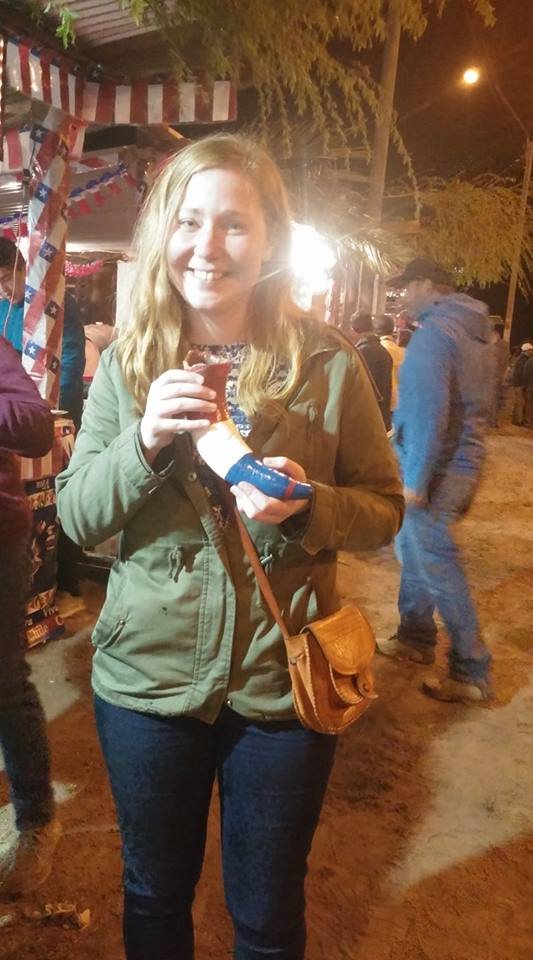
Drinking chicha during Independence Day
Chicha is also popular in the countryside; in the central region it’s made with grapes, and in the south with apples, almost like a cider. Usually it’s homemade, and so you bring your own bottles and fill ’em up.
Cheap beer like Cristal and Escudo are readily available in both cans and liter bottles. Liquor such as whiskey and basic vodkas are also easy to find, but don’t expect a large variety. Pisco, a brandy made from fermented grapes, is abundant: try a nice pisco sour at a restaurant.
Food
Chile is the home of delicious, huge empanadas. The standard empanada is de pino, which includes ground beef, onions, an olive, and a piece of boiled egg – absolutely delicious. I prefer the empanadas de horno, baked in a traditional clay oven, over the fried version.
Both Chile and Argentina also love their barbecues. They buy huge chunks of meat and sausage, or roast the animal whole, and then you just eat a bunch of meat. Choripan, or chorizo with bread, is a common item sold on the street. Completos, basically huge hot dogs, and sopaipillas, fried bread with pumpkin, are more street food staples. If you’re a vegetarian, you may not have a ton of options in parts of Chile.
Generally, Chilean food is hearty and wholesome. Soups are very popular, and “wet” food is preferred over “dry” food. Meat, potatoes and beans are common staples. The largest meal is lunch, and dinner (once, pronounced like the number 11 in Spanish) largely consists of bread with different spreads available.
Most Chileans are averse to spicy food except using merken sparingly, so alas if you are a spicy fan like I am you are largely out of luck. There is, however, homemade hot sauce (at least in the rural area I was in) so if you can find that you’ll be good to go.
Music & Nightlife
Nightlife is very popular in large cities, like pretty much everywhere in the world. Clubs are open very late, usually until after 4:00 a.m., so they don’t start getting packed until way after midnight: don’t arrive too early. You can also continue to buy liquor and beer at cervecerías at pretty much any time. I’m sure they close down at some point, but they were always open whenever I tried to go to one.
Music is by and large reggaeton and cumbia. Country areas also have their own version of folksy country music, called huaso music.
Transportation
Bus is by far the easiest and most developed way to get around. Every larger city has a bus terminal, including more local transportation options, such as shared taxis (colectivos) and local buses (micros).
Overnight buses aren’t the most fun, but they’re generally cheaper than flights and can also save you money on lodging. Most buses offer at least a snack, and some offer meals, but don’t expect it (TurBus is terrible, by the way; don’t use TurBus).
Buses are generally on time, but we had to wait a few different times for repairs to happen — sometimes you just have to go with it.
Domestic flights are also an option; with Sky airlines now established, flights have gone down dramatically and there are quite a few different local airports across the country (we flew from Santiago to Calama to save time).
Unfortunately, rail is very rare in Chile so when it comes to public transport buses and flights will be your best friends. Uber is also available in Santiago, although I didn’t have problems with hailing a taxi and getting to my destination. If you don’t know Spanish and don’t know where you’re going, though, taxis are known to take you on some wildly long rides.
Final Thoughts
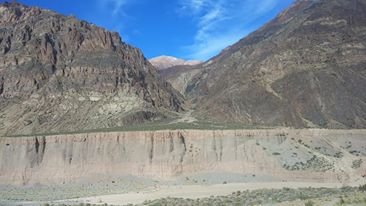
Scenery on the bus ride through the Andes Mountains
Chile is a jaw-droppingly beautiful country. It has so much variety, is easy to travel around, and generally very safe. Prices are higher than other countries in South America, especially in more touristy areas, but are still affordable. Chileans are friendly and so ready to share about their culture and norms. They love childish humor (think: poop and sex jokes) and many are very proud.
If you really want to explore a lot of areas, you’ll have to plan out a large amount of time. Even I barely scraped the surface of options when it comes to where you can go and what you can see. I would recommend at least a month; check out our month-long itinerary of Chile.
Liked this post? Pin it!


Subscribe to receive Snook Outta Water’s monthly newsletter with exclusive updates and content.
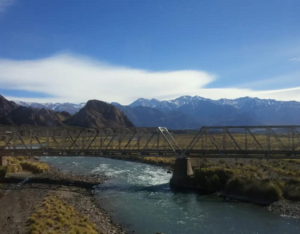
Leave a Reply